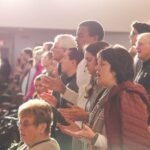Non-denominational churches often have unique worship styles. Unlike traditional denominations, these churches are not tied to specific rituals or practices. This flexibility allows them to develop diverse and dynamic ways to worship. Let’s explore how non-denominational churches approach worship and the differences you might notice.

Understanding Worship Styles in Non-Denominational Churches
Non-denominational churches are known for their varied worship styles. Since they are not limited by denominational guidelines, they can adapt their services to fit the needs and preferences of their congregation. For instance, some churches might focus on contemporary music, featuring modern worship songs and a lively atmosphere. Others may prefer a more traditional style with hymns and reflective music.
This diversity in worship styles means that non-denominational churches can cater to a wide range of preferences. As a result, attendees often feel more engaged and comfortable during worship. Additionally, this flexibility allows churches to create an environment where people can freely express their spirituality.
Key Differences in Worship Styles
One key difference in worship styles is the use of music. Non-denominational churches might feature a band or praise team playing instruments like guitars, drums, and keyboards. This can create an energetic and immersive worship experience. On the other hand, some non-denominational churches might opt for a simpler approach with just a piano or acoustic guitar, focusing on calm and contemplative worship.
Moreover, the structure of the worship service can vary greatly. Some non-denominational churches have a more formal structure with scheduled readings and sermons. Others may follow a more informal format, with spontaneous elements like open prayer or sharing personal testimonies. This variation allows each church to develop a worship style that best suits their community.
The Role of Teaching in Worship
Teaching is another area where non-denominational churches might differ from traditional denominations. In many non-denominational churches, the teaching is often centered around practical life application. Sermons may focus on everyday issues and how to address them from a biblical perspective. This approach can make the teachings feel more relevant and applicable to daily life.
In contrast, some denominational churches might emphasize theological studies or historical context in their teaching. While this is also valuable, the practical focus in non-denominational churches helps bridge the gap between religious teachings and real-life situations.
How Non-Denominational Churches Adapt Their Worship
Non-denominational churches frequently adapt their worship style to reflect the needs and preferences of their congregation. For example, they may introduce new music styles or change the format of their services based on feedback from attendees. This adaptability helps keep the worship experience fresh and engaging.
Additionally, non-denominational churches often encourage creativity in worship. This can include incorporating arts, drama, or multimedia elements into the service. Such innovations can enhance the worship experience and make it more interactive.
The Impact of Worship Style on Congregation
The worship style in non-denominational churches can significantly impact the congregation. A diverse and flexible worship approach often helps attract people who might feel disconnected from more traditional worship settings. By offering various styles, these churches can create a welcoming environment for everyone.
Furthermore, when worship styles resonate with the congregation, it can lead to increased participation and a stronger sense of community. People are more likely to engage in worship and other church activities when they feel that their preferences and needs are being considered.
Conclusion
In conclusion, non-denominational churches offer a wide range of worship styles, each tailored to the needs of their congregation. Their flexibility allows them to experiment with different music, teaching methods, and service formats. These differences create a dynamic and inclusive worship environment, making it easier for individuals to connect with their faith. By embracing diverse worship styles, non-denominational churches contribute to a more engaging and supportive community experience.











